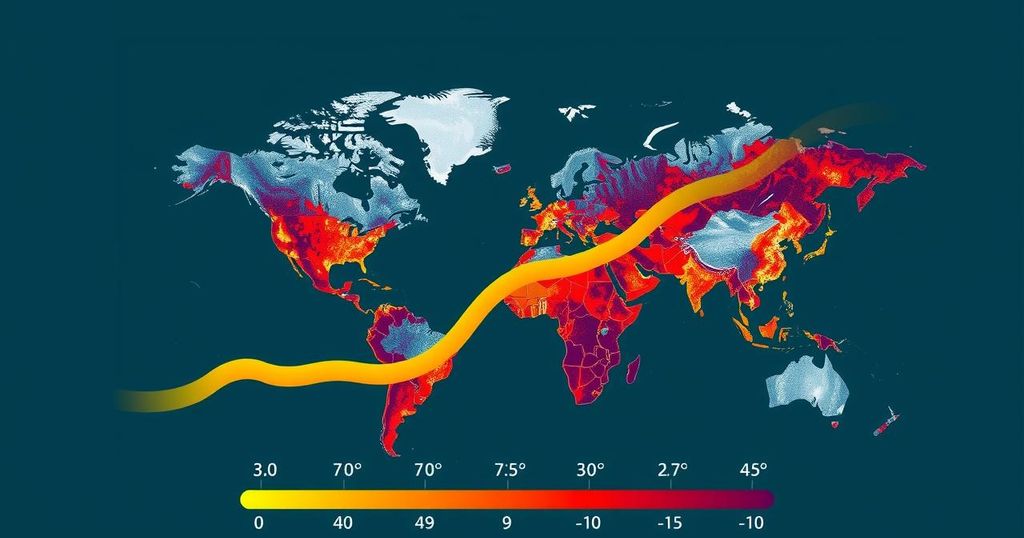A United Nations report indicates that without significant changes, the world could experience a rise in temperatures exceeding 3°C by 2100, far surpassing the Paris Agreement’s goal of 1.5°C. Current climate policies show an increase in emissions, with global greenhouse gas outputs reaching record levels. The report emphasizes the necessity for nations to commit to reducing emissions by 42% by 2030 to avert devastating climate impacts. The upcoming U.N. climate summit will be critical for setting stronger emissions reduction strategies.
According to a recent United Nations report, the world’s current trajectory in climate policy is set to result in a temperature increase of more than 3°C (5.4°F) by the close of this century. This alarming forecast is significantly higher than the ambitious target of limiting warming to 1.5°C (2.7°F), as agreed upon in the Paris Agreement signed in 2015. The annual Emissions Gap report reveals that without more stringent measures to curtail greenhouse gas emissions, the global temperature could rise by as much as 3.1°C (5.6°F) above pre-industrial levels by the year 2100. U.N. Secretary-General Antonio Guterres emphasized the urgency of the situation, stating, “We are teetering on a planetary tightrope. Either leaders bridge the emissions gap, or we plunge headlong into climate disaster.” The report highlights a consistent increase in global greenhouse gas emissions, which rose by 1.3% from 2022 to 2023, reaching a record high of 57.1 gigatonnes of carbon dioxide equivalent. Current commitments, if fulfilled, would still result in temperature increases ranging from 2.6°C (4.7°F) to 2.8°C (5°F) by 2100. Notably, the G20 nations have made minimal progress towards their 2030 climate targets, raising concerns about global efforts. As nations prepare to meet at the upcoming U.N. climate summit (COP29) in Azerbaijan, there is hope that negotiations will lead to more robust emissions reduction strategies. The report advocates for a 42% reduction in yearly greenhouse gas emissions by 2030, and a 57% reduction by 2035, to avoid surpassing the critical threshold of 1.5°C. Inger Andersen, executive director of the United Nations Environment Programme, stressed that “every fraction of a degree avoided counts.”
The issue of climate change continues to escalate, specifically regarding the adequacy of current international commitments to mitigate its effects. This report serves to evaluate the effectiveness of the promises made by nations towards emissions reduction and to highlight the dire predictions of future warming. Historical agreements, such as the Paris Agreement established in 2015, set ambitious targets to restrict global temperature increase. However, recent findings illustrate a troubling trend where actual policies and their implementation fall significantly short of these targets, necessitating stronger action.
The United Nations report underscores a grave warning regarding the trajectory of global warming under current climate policies. The potential rise in temperatures by over 3°C underscores the pressing need for governments to enhance their commitment to emissions reductions. As nations prepare for critical discussions at the upcoming U.N. climate summit, the emphasis placed on ambitious targets reflects the urgency of the climate crisis. Without immediate and substantial action, the objective of limiting warming to 1.5°C may remain unattainable, leading to catastrophic consequences for the planet.
Original Source: www.theweathernetwork.com







